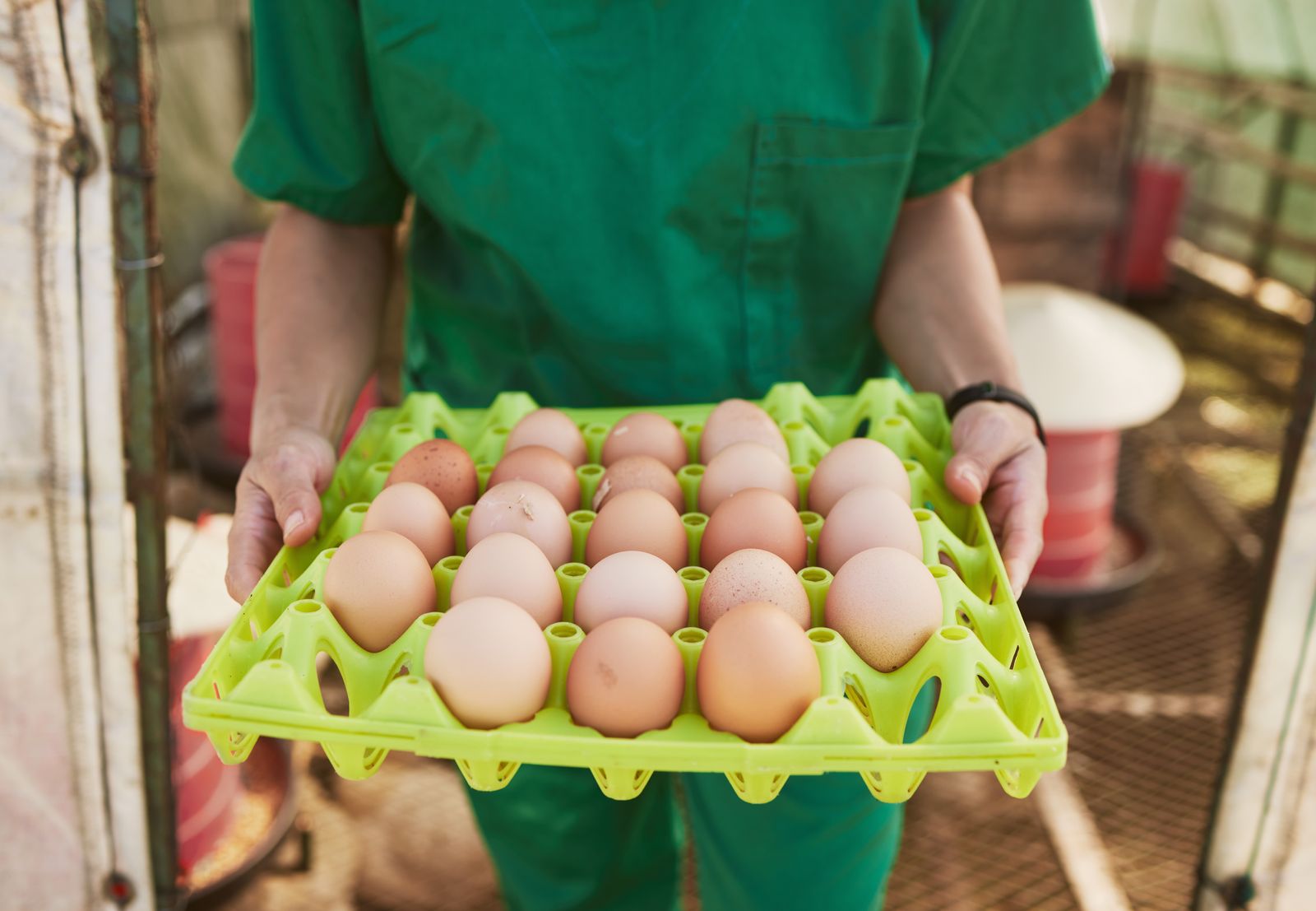For many people who keep backyard chickens, collecting fresh eggs each day is one of the highlights of this rewarding hobby. However, if you’ve noticed that some of your birds aren’t laying as many eggs as you’d expect, or if you’re wondering why some chickens never seem to lay eggs at all, you might be wondering what’s going on. Do some chickens not lay eggs?
All hens or female chickens lay eggs because it is part of their reproductive cycle. Some hens may slow down egg laying or stop for periods if certain circumstances or conditions, such as ill health, stress, an unsuitable nesting environment, inadequate nutrition, or lighting, are present.
We will explore the topic of chickens and egg-laying, focusing on the question of whether some chickens don’t lay eggs. We will also investigate various related topics, including what factors can affect a chicken’s egg production, at what age chickens typically start laying, and how to identify which chickens in your flock are not laying.
Do All Chickens Lay Eggs?
All chickens lay eggs because it is part of their reproductive cycle. However, you may see a reduction in the quantity and frequency of your chickens’ egg-laying cycles, which can be due to various circumstances or conditions.
If you have noticed a drop off in the egg production of your flock, you need to undertake some detective work to find the cause, rectify the problem and get your chickens laying eggs again!
What Causes Chickens To Stop Laying Eggs?
While chickens are generally reliable egg layers, various factors can cause them to stop laying. If you notice a drop in the number of eggs from your flock, you can check my list below to see if any of these conditions apply to your chickens.
- Age. Like all animals, chickens have a natural lifespan, and their egg production typically slows as they age. After a few years, some chickens may stop laying eggs altogether. To keep your flock producing a steady supply, you may need to replenish your flock with younger birds.
- Health. Various health issues, such as infections, parasites, or nutritional deficiencies, can impact a chicken’s egg-laying abilities. Chickens that are sick or stressed may also be less likely to lay eggs.
- Nutrition. A balanced diet is essential for chickens to lay eggs regularly. If your chickens are not getting enough protein, calcium, or other nutrients, their egg production may suffer.
- Lighting. Chickens require a certain amount of daylight each day to lay eggs. Their egg production may be affected if they are not getting enough natural light or if their artificial lighting is not set up properly.
- Stress. Chickens can experience stress from various sources, such as predators, overcrowding, or environmental changes. If a chicken is under stress, it may stop laying eggs or produce fewer eggs.
By addressing these factors and ensuring that your chickens have a healthy, low-stress environment, you can help maximize their egg-laying abilities.
At What Age Do Chickens Begin Laying Eggs?
The age at which chickens start laying eggs can vary depending on different breeds, individuals within a flock, and several factors, such as breed, diet, and environmental conditions. However, you can use general guidelines to predict when your chickens might start laying.
Most breeds of chickens will start laying eggs between 5 and 7 months of age. Some breeds, such as Leghorns, tend to mature faster and may start laying as early as 4 months of age. On the other hand, some heavier breeds, such as Cochins, may not start laying until they are 7 or 8 months old.
It’s important to understand that individual chickens within a breed can also vary in terms of their egg-laying timeline. Some chickens may start laying earlier or later than others, even if raised under the same conditions.
Some factors can influence when chickens start laying eggs. One key factor is nutrition; if a chicken is not getting enough of the right nutrients, it may delay the onset of egg-laying.
Lighting is also important, as chickens need at least 14 hours of daylight daily to stimulate their reproductive systems. If your chickens are not getting enough light, you may need to provide artificial lighting in their coop to help them start laying.
Generally, it’s best to be patient and let your chickens start laying eggs on their own timeline. However, if you’re concerned that your chickens are not starting to lay eggs within a reasonable timeframe, you may want to consult a veterinarian or an experienced chicken keeper to rule out any underlying health issues.
How Long Can A Chicken Go Without Laying An Egg?
Some chicken breeds are known for being prolific egg-layers, but even the healthiest and most productive hens will take occasional breaks from laying. So how long can a hen go without laying an egg?
Generally, a healthy chicken will lay eggs regularly during the egg-laying season, which typically lasts from spring through summer. However, outside of the egg-laying season, some chickens may take extended breaks from laying, and others may stop laying altogether.
The length of time a chicken can go without laying an egg can vary widely depending on the individual bird and other factors such as breed, age, and environment.
For example, some chickens may go a few days or even a week without laying an egg, while others may go several weeks or even months without laying.
There are various reasons why a chicken may stop laying eggs temporarily, such as changes in daylight hours, stress, illness, or molting.
During molting, chickens shed their old feathers and grow new ones, which requires a lot of energy and resources. As a result, chickens may take a break from laying during this time.
It’s important to note that if a chicken stops laying eggs for an extended period, it may indicate an underlying health issue or other problem. In such cases, you may want to consult with a veterinarian or an experienced chicken keeper to identify the issue and take appropriate action.
How Can You Tell Which Chickens Are Not Laying Eggs?
If you’re keeping chickens for their eggs, it’s important to be able to tell which birds in your flock are not laying.
I have highlighted some signs you can look out for that will help you pick out the non-performers in your chicken flock.
- Reduced or no time in the nesting box. Chickens actively laying eggs will often spend time in the nesting box. If you notice that a particular chicken is no longer spending time in the nesting box, it may indicate that she has stopped laying.
- Small or no comb and wattle growth. A chicken’s comb and wattles (the fleshy protuberances on its head and neck) can provide clues about its egg-laying status. Chickens actively laying eggs typically have large, bright red combs and wattles. Chickens not laying eggs may have smaller or paler combs and wattles.
- Changes in behavior. Chickens not laying eggs may exhibit changes in behavior, such as being less active, less vocal, or more aggressive toward other birds.
- Physical appearance. Chickens that are not laying eggs may appear less plump or have less muscle mass compared to birds that are laying regularly. They may also have a less shiny or duller plumage.
It’s important to note that some chickens may not lay eggs for reasons unrelated to their health or reproductive status, such as being too young or old or being in a molt. If you’re unsure why a particular chicken is not laying, you may want to consult an experienced chicken keeper or veterinarian to help you identify the issue.
What To Do About Chickens Not Laying Eggs
If you have chickens that are not laying eggs, there are several steps and strategies you can attempt to encourage them to start laying again.
Check For Health Issues
Chickens not laying eggs may be experiencing health problems such as respiratory infections, mites or other parasites, or nutritional deficiencies.
Check your hens regularly for signs of illness, and consult with a veterinarian service if you suspect an underlying health issue.
Adjust The Chicken’s Environment
Chickens require a comfortable and stress-free environment to lay eggs regularly. Ensure your birds have access to a clean and well-ventilated coop with plenty of nesting boxes.
Provide them with fresh water and a balanced diet appropriate for their age and breed.
Manage Your Chicken’s Lighting
Chickens rely on the length of daylight hours to stimulate egg production. If you have chickens that are not laying, providing them with artificial light in the coop may be helpful to supplement natural daylight. This can help encourage them to start laying again.
Give Your Chickens Time
Some chickens may naturally take breaks from laying eggs, especially as they age. In some cases, it may be a matter of waiting for the bird to resume laying on its own.
Consider Chicken Breed And Age
Some breeds of chickens are more prolific egg-layers than others, and individual birds may start laying at different ages.
For example, some heritage breeds may take longer to start laying than commercial breeds. Be patient and observe your birds to learn their individual laying habits.
If egg production is a priority on your homestead, select the correct chicken breed to maximize the number of eggs you can harvest.
It’s important to bear in mind that there is no magic one-size-fits-all solution for getting chickens to start laying eggs again. Each bird is unique and may require different environmental or diet adjustments to encourage egg production.
Conclusion
Chickens can stop laying eggs for various reasons, including health issues, environmental factors, and age. By understanding the factors that can affect egg-laying, you can take steps to encourage your birds to lay more consistently.
Monitor your flock closely and look for signs that a particular bird may have stopped laying, such as changes in behavior, reduced time in the nesting box, or changes in physical appearance. With a little patience, observation, and attention to their environment and diet, you can help your chickens resume laying eggs and enjoy a steady supply of fresh, nutritious eggs for your table.
References
https://www.muranochickenfarm.com/2017/08/hens-arent-laying.html



